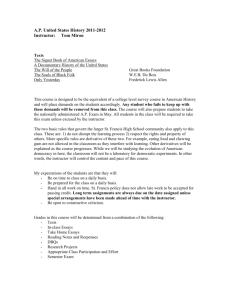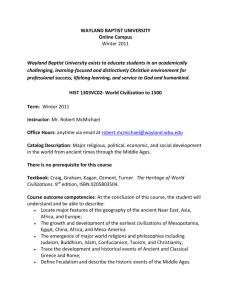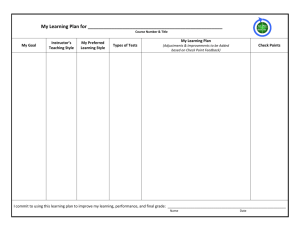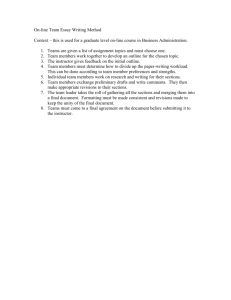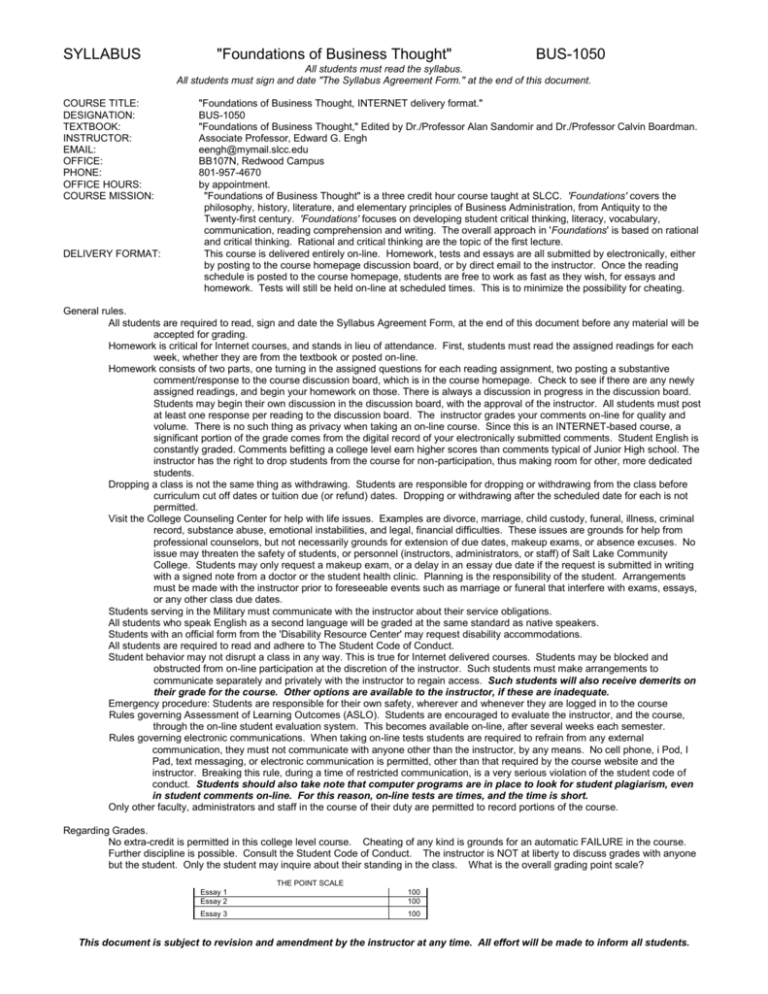
SYLLABUS
"Foundations of Business Thought"
BUS-1050
All students must read the syllabus.
All students must sign and date "The Syllabus Agreement Form." at the end of this document.
COURSE TITLE:
DESIGNATION:
TEXTBOOK:
INSTRUCTOR:
EMAIL:
OFFICE:
PHONE:
OFFICE HOURS:
COURSE MISSION:
DELIVERY FORMAT:
"Foundations of Business Thought, INTERNET delivery format."
BUS-1050
"Foundations of Business Thought," Edited by Dr./Professor Alan Sandomir and Dr./Professor Calvin Boardman.
Associate Professor, Edward G. Engh
eengh@mymail.slcc.edu
BB107N, Redwood Campus
801-957-4670
by appointment.
"Foundations of Business Thought" is a three credit hour course taught at SLCC. 'Foundations' covers the
philosophy, history, literature, and elementary principles of Business Administration, from Antiquity to the
Twenty-first century. 'Foundations' focuses on developing student critical thinking, literacy, vocabulary,
communication, reading comprehension and writing. The overall approach in 'Foundations' is based on rational
and critical thinking. Rational and critical thinking are the topic of the first lecture.
This course is delivered entirely on-line. Homework, tests and essays are all submitted by electronically, either
by posting to the course homepage discussion board, or by direct email to the instructor. Once the reading
schedule is posted to the course homepage, students are free to work as fast as they wish, for essays and
homework. Tests will still be held on-line at scheduled times. This is to minimize the possibility for cheating.
General rules.
All students are required to read, sign and date the Syllabus Agreement Form, at the end of this document before any material will be
accepted for grading.
Homework is critical for Internet courses, and stands in lieu of attendance. First, students must read the assigned readings for each
week, whether they are from the textbook or posted on-line.
Homework consists of two parts, one turning in the assigned questions for each reading assignment, two posting a substantive
comment/response to the course discussion board, which is in the course homepage. Check to see if there are any newly
assigned readings, and begin your homework on those. There is always a discussion in progress in the discussion board.
Students may begin their own discussion in the discussion board, with the approval of the instructor. All students must post
at least one response per reading to the discussion board. The instructor grades your comments on-line for quality and
volume. There is no such thing as privacy when taking an on-line course. Since this is an INTERNET-based course, a
significant portion of the grade comes from the digital record of your electronically submitted comments. Student English is
constantly graded. Comments befitting a college level earn higher scores than comments typical of Junior High school. The
instructor has the right to drop students from the course for non-participation, thus making room for other, more dedicated
students.
Dropping a class is not the same thing as withdrawing. Students are responsible for dropping or withdrawing from the class before
curriculum cut off dates or tuition due (or refund) dates. Dropping or withdrawing after the scheduled date for each is not
permitted.
Visit the College Counseling Center for help with life issues. Examples are divorce, marriage, child custody, funeral, illness, criminal
record, substance abuse, emotional instabilities, and legal, financial difficulties. These issues are grounds for help from
professional counselors, but not necessarily grounds for extension of due dates, makeup exams, or absence excuses. No
issue may threaten the safety of students, or personnel (instructors, administrators, or staff) of Salt Lake Community
College. Students may only request a makeup exam, or a delay in an essay due date if the request is submitted in writing
with a signed note from a doctor or the student health clinic. Planning is the responsibility of the student. Arrangements
must be made with the instructor prior to foreseeable events such as marriage or funeral that interfere with exams, essays,
or any other class due dates.
Students serving in the Military must communicate with the instructor about their service obligations.
All students who speak English as a second language will be graded at the same standard as native speakers.
Students with an official form from the 'Disability Resource Center' may request disability accommodations.
All students are required to read and adhere to The Student Code of Conduct.
Student behavior may not disrupt a class in any way. This is true for Internet delivered courses. Students may be blocked and
obstructed from on-line participation at the discretion of the instructor. Such students must make arrangements to
communicate separately and privately with the instructor to regain access. Such students will also receive demerits on
their grade for the course. Other options are available to the instructor, if these are inadequate.
Emergency procedure: Students are responsible for their own safety, wherever and whenever they are logged in to the course
Rules governing Assessment of Learning Outcomes (ASLO). Students are encouraged to evaluate the instructor, and the course,
through the on-line student evaluation system. This becomes available on-line, after several weeks each semester.
Rules governing electronic communications. When taking on-line tests students are required to refrain from any external
communication, they must not communicate with anyone other than the instructor, by any means. No cell phone, i Pod, I
Pad, text messaging, or electronic communication is permitted, other than that required by the course website and the
instructor. Breaking this rule, during a time of restricted communication, is a very serious violation of the student code of
conduct. Students should also take note that computer programs are in place to look for student plagiarism, even
in student comments on-line. For this reason, on-line tests are times, and the time is short.
Only other faculty, administrators and staff in the course of their duty are permitted to record portions of the course.
Regarding Grades.
No extra-credit is permitted in this college level course. Cheating of any kind is grounds for an automatic FAILURE in the course.
Further discipline is possible. Consult the Student Code of Conduct. The instructor is NOT at liberty to discuss grades with anyone
but the student. Only the student may inquire about their standing in the class. What is the overall grading point scale?
THE POINT SCALE
Essay 1
Essay 2
100
100
Essay 3
100
This document is subject to revision and amendment by the instructor at any time. All effort will be made to inform all students.
Exam 1
Exam 2
Exam 3
Homework & Participation
100
100
100
300
Total Points
900
How may students determine their progress? All students must maintain their own grading matrix, filling out the scores of their own
work as the course progresses. All students must turn the grade matrix in on the last day of class, with the final exam. This
serves as means for the instructor to cross check the instructor's record with that of the student. To self evaluate progress
merely compare the total score to the points possible for the course.
Students may only request a makeup exam, or a delay in an essay due date if the request is submitted in writing with a signed note
from a doctor.
All Essays, Exams, and Homework Assignments, must have the student last name, first name, student ID number, submission date,
course and section in the TOP, LEFT corner of the first page. All Homework is due on the day that topic is to be discussed,
prior to discussion. No Homework may be submitted late. No Essays may be submitted late. Exams must be taken in a
controlled situation on the assigned date. Arrangements for controlled situation for exams will be announced prior to any
test. Exams will include questions from this syllabus material. This instructor uses a competitive (or curved) grading scale
to teach the principle of 'competitive advantage.' Business is fundamentally competitive.
How is the curve created? The curve is not created until the week after the final exam is completed. The instructor will add up all the
exam, test, homework, and group project points for each student. Using the total points, the following calculation yields the
average-class-width (ACW). ((high grade) - (low grade)/12) = ACW After calculating the ACW, the section curve is
calculated.
LETTER GRADE
A
THE GRADING SCALE
LETTER GRADE
LETTER GRADE
HIGH
LOW
Highest student
points in the class.
Minus the ACW.
LETTER GRADE
RANGE
This should always
equal the ACW.
AB+
Rules governing homework.
Do not plagiarize. Do not copy other's homework. The computer checks this. It must be submitted electronically before the beginning
of each class discussion. Late homework is not accepted. The homework is fundamentally always the same. Supplementary
readings for homework will occasionally be emailed to students. Homework must be emailed to eengh@mymail.slcc.edu with all the
required student and course information in the top left corner. The email subject tab must contain "BUS-1050- Your Section number
-HOMEWORK." Submit all homework by email. FOR EACH AND EVERY READING ASSIGNED IN THIS CLASS students must
answer the following questions with at least one full sentence (the more thoughtful, accurate and complete the answer, the higher the
score:
1.
Who is the author? (Name and general personal information. ie., who wrote the piece, basic biographical info.)
2.
What is the topic of the reading? (Do not just retype the title. Explain the topic in your words. One paragraph.)
3.
When did the author live? When did the author write this piece? Who are some other important people from that time?
4.
Where is the author from? What other authors or important people come from that place?
5.
Why is this reading relevant to business? This is perhaps the hardest and most important question.
6.
How do you, the student react to this reading? In in question you may use first-person.
7.
Textbook Study Questions: Most of the textbook readings have short study questions at the end. After answering the
questions above, students must then write short answers to each of these textbook questions. Thus, a typical homework
assignment has about 10 questions the student must answer. If no questions for that reading in the textbook, students must
still answer the other 6 questions above.
8.
Special questions from the instructor for each reading are usually posted as announcement in the course homepage.
Rules governing essays. Since this is an internet course, some or all of the essays may be assigned with each test, simplifying the number of
times needed to meet in a controlled situation. This means the tests and the essays will probably be written and submitted at the
same time. Do not plagiarize. All essays are submitted electronically, through email, with no exceptions. Students must keep in mind
the College uses special software to scan essays for plagiarism. Plagiarism is grounds for an automatic FAILURE in the course.
Further discipline is possible. Consult the Student Code of Conduct.
Three essays are required. The topic of the first essay is shown below.
1. Essay 1 Topic: “Irrational Thinking is Never Wise in Business. Why?" Students must explain the difference between rational and
irrational thought, moreover how this relates to business. Purpose: this essay requires students to demonstrate two things: first
that they can write on a twelfth-grade level, second that they can explain what it means to think rationally about business. Essay
1 is One page, single spaced, and emailed to the instructor.
2. Essay 2 Topic: “What is the Economic Revolution?” Essay 2 is two pages, single spaced, and emailed tot the instructor.
3. Essay 3 Topic: “Compare and Contrast Thomas Jefferson's and Alexander Hamilton's vision for the future of The United States of
America.” Essay 3 is two pages, single spaced, and emailed to the instructor.
What are the essay grading criteria? Any of the issues mentioned in the Style Guide for Essays may be deducted from the student's
essay score. Repeated errors will receive additional demerits in the same essay. Essays and homework are over half of the 800
points possible for the final grade.
Style Guide for Essays AND homework. Shown here are the standards for writing on college level, post twelfth grade.
No use of First-person: I, me, we, us, our, ours, ourselves.
No use of Passive Voice. Passive "He did run." Active "He ran."
Do not put the reader directly into the essay. This means do not say you, your or yours. Doing this makes the essay
about the reader, when it should be about the topic.
No misspelled words, contractions, cliché's, colloquialisms, jingoisms, or jargon. Look these terms up before
deciding that you know how to avoid them.
No punctuation errors.
This document is subject to revision and amendment by the instructor at any time. All effort will be made to inform all students.
The "spell checker" on the student's computer must be set to include both grammar and style, in addition to spelling.
Furthermore, all options must be turned on in the grammar settings section.
Do not use a writing style other than the Style Guide for Essays included in this syllabus.
Quotations of three or more lines must be single spaced, indented left and right, and have a citation in the works
cited page.
We expect that most or all sources for the essays will be from the textbook. Direct quotations from the professor
are acceptable if accompanied by proper citation (as with lecture notes).
All essays must follow the Style Guide for Essays contained in this syllabus.
Rules governing examinations.
There will be three exams. The last one will be on the last day of the semester. All exams are done live, on-line, together as a group,
through the chat room and email in the course homepage. EXAM TIMES WILL BE SCHEDULED AND POSTED IN ADVANCE.
Students unable to take the official, on-line exam must take a separate exam in the professor's office at another scheduled time. All
exams have a time limit. Questions are usually multiple choices, true-false, and have thirty to one hundred questions. Vocabulary
words are frequently used on exam questions. Most exam questions come straight from the homework assignments: who, what,
when, where, why and how. This course does not have a comprehensive final exam.
Rules Governing Discussion.
The textbook and lectures are in English. All discussions and assignments are to be in English. Students with English as a second
language are graded at the same level as native English speakers. Instructor comments regarding student English are to be
understood as professional, educational assessments, and are not reflections on personal character. Students are strongly
encouraged to become fluent in modern English and the vocabulary of Business. Vocabulary words are frequently used on exam
questions. Students are viewed more professionally if they use modern professional English. For example, do not use the following
phrases: "Like . . . Kind of . . . Sort of . . . Basically . . . You know . . . Um . . . We all know . . . Totally . . ."
This course is taught through a state funded institution, Salt Lake Community College. The establishment clause of the US
Constitution is worth mentioning. The establishment clause is Amendment 1 from the Bill of Rights.
Amendment I
Congress shall make no law respecting an establishment of religion, or prohibiting the free exercise
thereof; or abridging the freedom of speech, or of the press; or the right of the people peaceably to
assemble, and to petition the Government for a redress of grievances.1
Religion, Tradition and Authority are integral parts of the material of this course. Interconnections between religion, society,
economics, and politics are described and discussed at length in the readings from the textbook, but also in other assigned readings.
Some chapters in the textbook bring up religion directly, others indirectly. (See the following authors: Heilbroner, Tawney, Gandhi,
Veblen, Weber, Darwin, Marx, Lawrence, Thoreau, Cicero, Ayn Rand, and Galbraith.) Students must discuss these matters without
defaming or showing undo-deference toward any religion, or belief system. Synonyms of defamation; detraction: calumniation2,
3
4
traducement, untruth. Synonyms of deference; obedience: obsequiousness, slavishness, servility. Religious jingoism5 is not
acceptable. This instructor makes no distinction between religions, churches, superstitions, myths, legends, observance, or belief
systems. This general statement means to imply students and faculty may discuss these things vigorously, forthrightly, professionally,
rationally, and critically, as they pertain to this course.
1
2
http://www.archives.gov/exhibits/charters/bill_of_rights_transcript.html
These are excellent vocabulary words and may appear in exams.
3
The Original Roget's Thesaurus of English Words and Phrases (Americanized Version) is licensed from Longman Group UK Limited.
Copyright © 1994 by Longman Group UK Limited. All rights reserved.
4
The Original Roget's Thesaurus of English Words and Phrases (Americanized Version) is licensed from Longman Group UK Limited.
Copyright © 1994 by Longman Group UK Limited. All rights reserved.
5
Extreme loyalty expressing itself especially in hostility toward others.
This document is subject to revision and amendment by the instructor at any time. All effort will be made to inform all students.
========================================================================
SEND ONLY THE PORTION BELOW BACK TO THE INSTRUCTOR, BY EMAIL.
Syllabus Agreement Form.
Student Name Printed: ____________________
Student ID Number:
____________________
Course and Section:
____________________
By signing and dating this form, YOU indicate that YOU have read and understand the syllabus.
Moreover, YOU CERTIFY that you accept the Student Code of Conduct, and will abide by it at
all times.
Student Signature:
____________________ (typed or digitally signed.)
Date:
____________________
This document is subject to revision and amendment by the instructor at any time. All effort will be made to inform all students.

